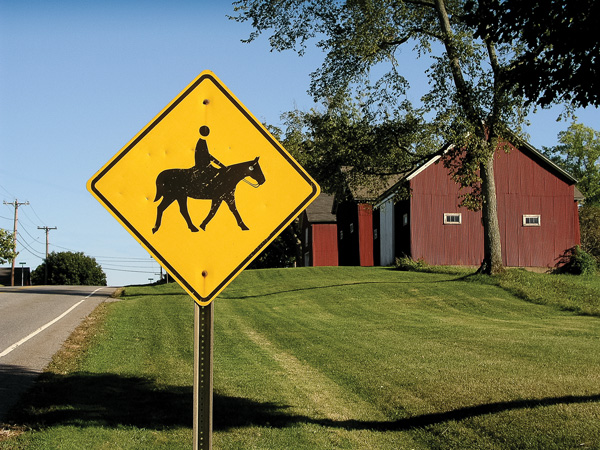If you live and ride in an urban or suburban community, you know how important it is to conserve the trails near your home. In addition, it’s vital to keep riding, show, and boarding facilities within the community. This gives people who don’t own horse property a chance to ride, show, and board their horses or just enjoy equine events.

Community members have a say in who uses their recreational spaces and trails via participation in the planning and administration of public and green space.
Many cities that historically have had equestrian trails and facilities are losing them rapidly, or have already lost them. For example, Masterson Station Park in Lexington, Kentucky, with its extensive riding and cross-country facilities, is under pressure by youth sports groups to create a sports park, eliminating equine use. Local equine groups continue to advocate for equine use via the planning and public participation process.
In Chicago, Illinois, equine facilities within the city have been completely eradicated. In New Jersey, communities have suffered a rapid decline in horse properties and trails due to land-use changes brought about by unfavorable planning decisions.
What You Can Do
Here’s what you can do to help your community understand and respond favorably to your equine community’s recreational and land needs.
• Be visible. Nonequestrian citizenry can easily misunderstand or fear horses, leading them to deny rider access to trails and other equine facilities. Show them how joyful and useful horses are to humans and how they can interact safely with nonequestrians. Let them see you ride on existing trails and at equestrian venues. Help them engender a lasting appreciation for the riding experience. It might even bring them into the fold. And that’s more important than you might imagine.
• Be courteous. On both private and public trails, respect riding rules, trail conditions, and other users, so nonequestrians have no reason to close these areas to equestrian use. Be friendly. Take time to talk to anyone who’s interested in your horse and your riding life.
• Get involved. Participate in the planning process. Learn what language is in the comprehensive plan and recreational plans that allow or disallow horses on public trails. Advocate for access by educating decision-makers on the value of horses. Make sure trails and facilities are both allowed and protected, and that zoning changes near horse properties aren’t adversely impacted by zoning development decisions.
• Get organized. Form or join an organization or club so the equine community’s voice and needs are heard by decision makers. Participate in the master planning of trails. Include language favorable to horse trails and facilities in the comprehensive plan and protective ordinances. Advocate for a comprehensive trail system that connects trails. Educate yourself, the public, and community planners about the value of horses. Share favorable information with the public via websites and social media.
• Maintain trails. Help out with trail maintenance, and let decision-makers know that you have a plan for doing this in the long-term. You can do this via your organization or club, or join your local chapter of Back Country Horsemen of America (www.bcha.org).
For more on local, state, and federal agencies, and what you can do to protect and promote access to trails in your community, visit www.elcr.org.
Denise Y. O’Meara, RLA, is a professional landscape architect, writer, conservationist, and horsewoman. She has extensive experience in Thoroughbred breeding, care, and farm management, and enjoys trail riding and hiking. As a landscape architect, O’Meara has developed a refined sense of how the natural and built environments can and must coexist, where people and horses fit in, and what we can do to protect our open land and water for the future.
The Equine Land Conservation Resource is the only national not-for-profit organization advancing the conservation of land for horse-related activity. ELCR serves as an information resource and clearinghouse for land and horse owners on issues related to equine land conservation, land-use planning, land-stewardship/best-management practices, trails, liability, and equine economic development. For more information, call (859) 455-8383, or visit www.elcr.org.






